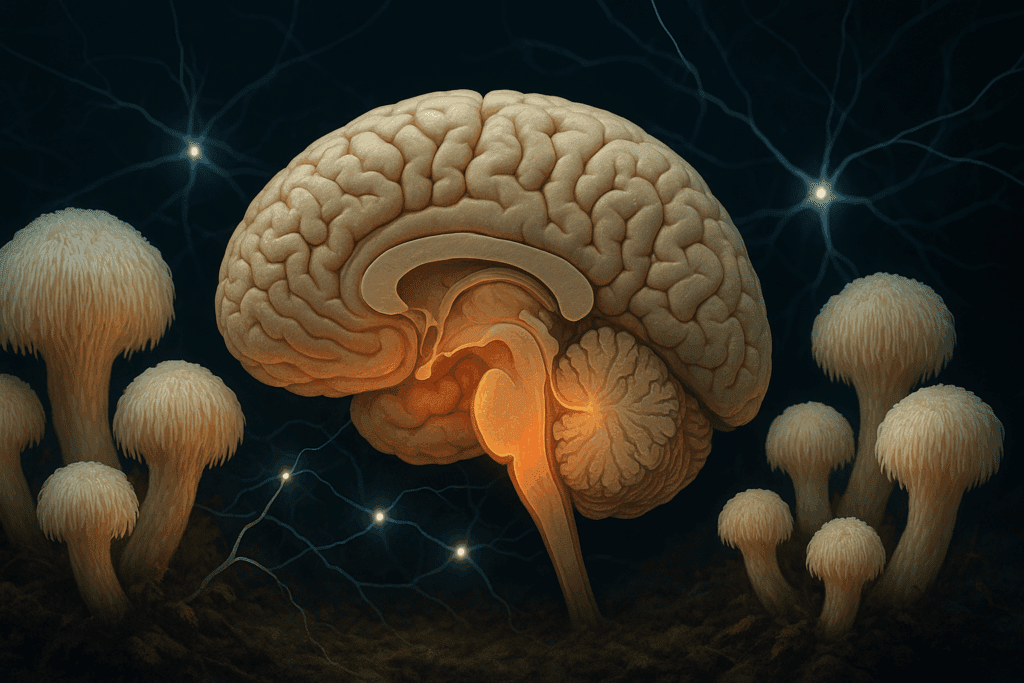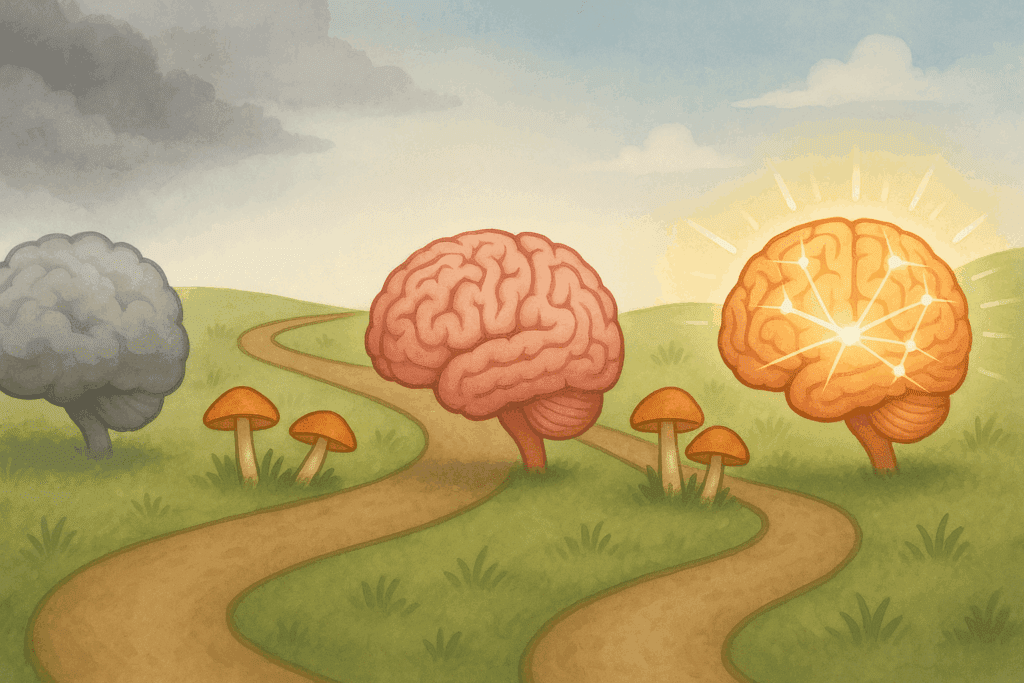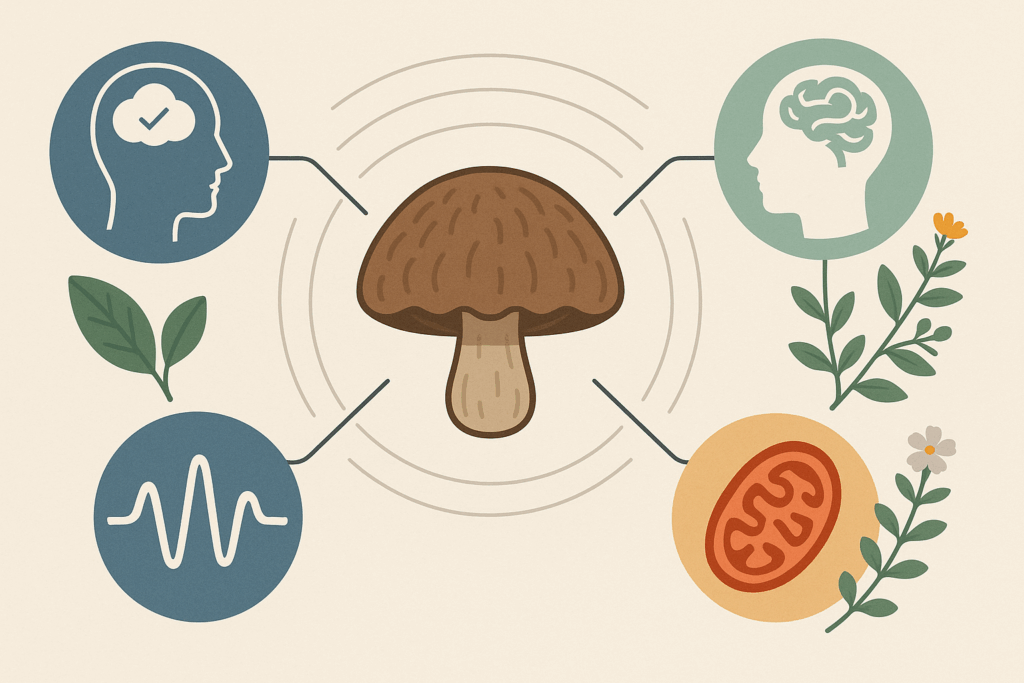Unlocking the Potential of the Focus Mushroom for Brain Health
In the ever-evolving field of cognitive neuroscience and nutritional psychiatry, researchers and health-conscious consumers alike are increasingly turning to natural supplements to enhance mental performance and preserve cognitive vitality. Among the most compelling options to emerge in recent years is the focus mushroom, a functional fungi that has captivated attention for its potential to support memory, attention span, and overall brain health. This remarkable natural substance, often included in what is known as a “focus blend” or “focus organic mushroom blend,” is gaining traction not only in academic circles but also in mainstream wellness communities. With an expanding body of evidence suggesting that these mushrooms may influence neurogenesis, neurotransmitter balance, and oxidative stress reduction, understanding their full impact is both timely and essential.
What distinguishes a focus mushroom from other nootropic options is its adaptogenic nature combined with neuroprotective properties. Adaptogens are substances that help the body adapt to stress, while nootropics are cognitive enhancers that support brain function. When these characteristics intersect in a single natural ingredient, the result is a powerful supplement that holds promise for mental clarity, sharper memory, and enhanced learning capacity. As we dive deeper into the science and experiential knowledge surrounding focus mushrooms, it becomes clear that their benefits extend far beyond temporary boosts in concentration. They represent a holistic, integrative approach to brain wellness that aligns with both traditional wisdom and modern medical science.
You may also like: The Ultimate Guide to the Best Nootropic Mushrooms for Memory and Cognitive Enhancement

Boosting Short-Term Memory Retention with Focus Mushroom Extracts
Short-term memory plays a crucial role in everyday life, influencing our ability to perform tasks, solve problems, and retain new information. One of the most compelling benefits of the focus mushroom is its impact on the consolidation and recall of short-term memories. Compounds such as hericenones and erinacines—particularly abundant in species like Lion’s Mane—stimulate the production of Nerve Growth Factor (NGF), a neuropeptide vital to the development and survival of neurons. This stimulation is associated with improved synaptic plasticity, which in turn enhances memory retention and cognitive processing speed.
Moreover, studies suggest that regular supplementation with a focus mushroom or a carefully curated focus blend can lead to noticeable improvements in verbal recall and working memory. These effects are particularly beneficial for students, professionals, and older adults who face memory challenges due to age-related decline or high cognitive load. Importantly, these enhancements are achieved without the jittery side effects commonly associated with synthetic stimulants, making focus mushrooms an appealing natural alternative.
Mechanistically, focus mushrooms exert their influence through both antioxidant pathways and anti-inflammatory responses. Chronic inflammation and oxidative stress have long been implicated in cognitive decline, including conditions such as mild cognitive impairment and Alzheimer’s disease. By mitigating these harmful processes, the focus mushroom creates a neuroprotective environment that is conducive to memory formation and retention. These multifaceted actions offer a sustainable, evidence-backed approach to enhancing mental performance through natural means.

Enhancing Cognitive Flexibility and Adaptability in Complex Tasks
Cognitive flexibility—the ability to switch between different thoughts or adapt behavior in response to changing stimuli—is a core aspect of executive function. It allows individuals to manage multiple tasks, solve novel problems, and adjust strategies when faced with unexpected challenges. Emerging evidence suggests that the focus mushroom can play a significant role in enhancing this crucial cognitive skill, particularly through its modulation of neurotransmitters like dopamine and acetylcholine.
Species such as Cordyceps and Reishi, often featured in a focus organic mushroom blend, are known to influence mitochondrial energy production and neurochemical balance. These actions translate into improved mental agility, sharper problem-solving abilities, and heightened creativity. For professionals working in dynamic environments—such as business leaders, educators, and creatives—this enhanced cognitive flexibility can be transformative. It enables quicker adaptation, more effective multitasking, and better decision-making under pressure.
From a biochemical standpoint, the adaptogenic properties of focus mushrooms also contribute to reduced cortisol levels and balanced adrenal function. This hormonal regulation indirectly supports cognitive flexibility by reducing mental fatigue and improving resilience under stress. As the brain is freed from the burden of chronic stress hormones, its capacity to engage in flexible thinking and innovative reasoning expands. This synergy of neurochemical support and stress resilience forms a compelling case for the inclusion of focus mushrooms in cognitive wellness protocols.

Promoting Neurogenesis and Brain Cell Regeneration
Neurogenesis—the process by which new neurons are formed in the brain—was once believed to be impossible after early childhood. However, modern neuroscience has overturned this notion, revealing that certain regions of the adult brain, particularly the hippocampus, continue to produce neurons throughout life. This discovery has profound implications for cognitive enhancement, particularly in areas like memory, learning, and emotional regulation. Among natural interventions that support neurogenesis, the focus mushroom stands out for its ability to stimulate NGF and Brain-Derived Neurotrophic Factor (BDNF), both of which are key to neuronal growth and survival.
In animal models, supplementation with Lion’s Mane mushroom has been shown to increase neurogenesis in the hippocampus, leading to improved performance on learning and memory tasks. These effects are believed to be mediated by the mushroom’s unique compounds, which activate signaling pathways involved in cell proliferation and differentiation. In humans, early clinical trials and observational studies suggest similar benefits, though further research is needed to establish optimal dosing and long-term outcomes. Nonetheless, the preliminary findings are promising and align with traditional uses of medicinal mushrooms in Eastern medicine.
Importantly, the regenerative potential of the focus mushroom is not limited to neurons alone. Glial cells, which support and protect neurons, also appear to benefit from mushroom-derived bioactives. This comprehensive support for brain cell health underpins the mushroom’s ability to maintain cognitive function even in the face of age-related degeneration or injury. For those seeking to preserve mental clarity and cognitive capacity into later life, incorporating a focus mushroom or focus blend into a daily wellness regimen may offer a science-backed strategy for lifelong brain health.

Improving Attention Span and Sustained Focus Naturally
In an age of constant distraction and digital overload, maintaining a prolonged attention span has become increasingly difficult for many individuals. The ability to concentrate on a single task without succumbing to external stimuli or internal restlessness is essential for productivity, learning, and mental well-being. One of the core benefits of the focus mushroom lies in its capacity to enhance sustained attention and reduce mental fatigue through gentle, natural mechanisms.
Unlike conventional stimulants such as caffeine or modafinil, which force heightened alertness through adrenergic pathways, focus mushrooms operate by nourishing the brain’s foundational systems. They support mitochondrial efficiency, balance neurotransmitter levels, and reduce neuroinflammation—all of which contribute to a stable, focused mental state. Clinical and anecdotal reports indicate that users of focus organic mushroom blends often experience a subtle yet noticeable improvement in their ability to remain engaged during meetings, academic tasks, or creative projects.
This benefit extends across age groups and cognitive profiles, from students preparing for exams to older adults managing complex responsibilities. By promoting alpha brainwave activity—associated with relaxed alertness—focus mushrooms help individuals enter a state of flow where distractions are minimized, and cognitive performance is optimized. This effect is especially valuable in environments that demand sustained mental effort over extended periods, such as academic research, professional writing, or strategic planning.
The natural origins of focus mushrooms also mean they are generally well-tolerated, with minimal side effects or risk of dependency. This makes them an appealing option for individuals seeking long-term support for attention and mental clarity without resorting to pharmaceutical interventions. The combination of efficacy, safety, and sustainability positions focus mushrooms as a leading choice in the realm of natural cognitive enhancers.
Supporting Emotional Resilience and Mental Clarity Under Stress
Cognitive performance is not solely a function of memory and attention; it is also profoundly influenced by emotional state and psychological well-being. Stress, anxiety, and mood disorders can significantly impair cognitive abilities, leading to brain fog, indecision, and memory lapses. Focus mushrooms, with their adaptogenic and neuroprotective properties, offer a multifaceted solution to these challenges. By regulating the hypothalamic-pituitary-adrenal (HPA) axis and modulating stress-related neurotransmitters like serotonin and GABA, they foster a more balanced emotional state conducive to cognitive clarity.
Research indicates that mushrooms like Reishi, Cordyceps, and Lion’s Mane can lower cortisol levels, enhance mood, and reduce symptoms of anxiety. These effects contribute indirectly to improved cognitive function by eliminating emotional barriers to clear thinking. For individuals facing high-stress environments—whether due to demanding jobs, academic pressure, or personal challenges—the use of a focus blend can provide both mental steadiness and emotional equilibrium.
This integrative approach to cognitive enhancement aligns with modern understandings of the mind-body connection. Mental clarity arises not only from enhanced neurotransmission but also from reduced emotional interference. By supporting the entire psychoneuroendocrine system, focus mushrooms offer a holistic path to optimized cognitive function. They enable the brain to perform at its best by ensuring that emotional disturbances do not cloud judgment or disrupt concentration.
Moreover, the long-term use of focus mushrooms has been associated with increased psychological resilience and reduced risk of burnout. This makes them particularly valuable for individuals in high-responsibility roles, such as healthcare professionals, executives, and educators. By addressing both the mental and emotional dimensions of cognitive health, focus mushrooms stand out as a comprehensive tool for brain optimization.
Enhancing Learning Capacity and Knowledge Retention
Learning is a dynamic process that requires the encoding, storage, and retrieval of information—each of which can be supported by the neuroactive compounds found in focus mushrooms. These functional fungi not only improve memory and attention but also enhance the brain’s ability to acquire and integrate new knowledge. This is particularly relevant for students, lifelong learners, and professionals in knowledge-intensive fields.
Mechanistically, the enhancement of learning capacity can be traced to the upregulation of neurotrophins like NGF and BDNF, which strengthen synaptic connections and facilitate long-term potentiation (LTP). LTP is a cellular process underlying memory formation and is critical for effective learning. By supporting these pathways, the focus mushroom aids in the consolidation of new information and the formation of durable memory traces. This leads to improved academic performance, faster skill acquisition, and greater cognitive adaptability.
In addition to biochemical support, focus mushrooms contribute to an optimal mental state for learning. Their ability to promote relaxed alertness and reduce mental fatigue makes it easier to engage with complex material and maintain motivation over long study sessions. Whether one is preparing for professional certification, learning a new language, or exploring advanced scientific concepts, a focus organic mushroom blend can provide the cognitive stamina and clarity needed to succeed.
Practical applications of these benefits are already being seen in educational and corporate settings, where cognitive supplements are integrated into wellness programs. As demand for mental performance enhancement grows, focus mushrooms are increasingly recognized as a safe, effective, and natural option. Their ability to support both the physiological and psychological aspects of learning makes them uniquely suited to the needs of modern knowledge workers and students alike.

The Long-Term Cognitive Advantages of Daily Focus Mushroom Supplementation
As with any wellness intervention, the benefits of focus mushrooms are most pronounced when used consistently over time. Long-term supplementation allows for the cumulative effects of neurogenesis, inflammation reduction, and hormonal balance to fully manifest. This sustained support contributes to the prevention of age-related cognitive decline and enhances cognitive reserve—the brain’s ability to withstand damage or dysfunction without a noticeable loss of function.
Daily use of a high-quality focus blend or focus organic mushroom blend can thus serve as a foundational element in a comprehensive brain health strategy. Over weeks and months, users often report deeper mental clarity, improved emotional stability, and greater confidence in their cognitive abilities. These subjective experiences are increasingly backed by longitudinal studies showing that regular intake of functional mushrooms correlates with improved markers of brain health, including hippocampal volume, neurotransmitter balance, and neuroinflammation markers.
Importantly, these long-term benefits extend beyond individual performance to encompass broader aspects of well-being. Enhanced cognitive function supports better decision-making, more effective communication, and greater life satisfaction. In this way, the daily use of focus mushrooms is not merely a tool for productivity but a means of fostering a richer, more engaged life. As the science continues to evolve, so too does our understanding of the profound potential of these natural neuroenhancers.
Incorporating these mushrooms into daily routines can be done through capsules, tinctures, or powdered forms mixed into beverages. Consistency, quality, and dosage are key variables that influence efficacy, and users are encouraged to consult with healthcare professionals to tailor supplementation to their unique needs and health conditions. With the right approach, focus mushrooms can become a central pillar of a proactive, evidence-based cognitive wellness regimen.

The Synergistic Effects of Focus Mushroom with Other Nootropics
While the focus mushroom on its own offers a robust range of cognitive and emotional benefits, its effectiveness can be significantly amplified when combined with other evidence-based nootropic substances. This synergistic potential has led to the growing popularity of integrated supplements that merge multiple adaptogens and neuroactive compounds into a single formulation. These comprehensive stacks often include ingredients such as Rhodiola rosea, L-theanine, Bacopa monnieri, and ginkgo biloba—all of which have been shown to enhance mental clarity, stress resistance, and memory retention.
One of the key advantages of these combinations lies in their ability to target multiple neurochemical pathways simultaneously. For instance, while the focus mushroom promotes neurogenesis and modulates NGF, Rhodiola rosea helps regulate cortisol levels and enhances mitochondrial function. L-theanine, on the other hand, is known for its calming effects and its ability to increase alpha brainwave activity—further enhancing the mental state that supports focused attention. Together, these compounds create a synergistic effect that is often more potent and balanced than any single ingredient alone.
When formulated into a well-researched focus blend, these components can work in harmony to create a cognitive environment that supports both high-level performance and long-term brain health. However, it is essential that such formulations are crafted with precision, taking into account the appropriate dosages, timing, and bioavailability of each ingredient. Consumers are advised to seek out products that are third-party tested and formulated by reputable companies that specialize in integrative health. With careful selection, a multi-ingredient focus stack can serve as a powerful ally in the pursuit of cognitive excellence.
Focus Organic Mushroom Blend: Choosing the Right Supplement for Your Needs
As the demand for natural cognitive enhancers continues to grow, so too does the variety of products available on the market. Among these, the focus organic mushroom blend has emerged as a standout choice due to its purity, sustainability, and efficacy. These blends typically combine several mushroom species—such as Lion’s Mane, Cordyceps, and Reishi—with complementary herbs or adaptogens to provide a comprehensive brain-boosting solution. However, not all mushroom supplements are created equal, and selecting the right product requires a discerning approach.
One of the most important factors to consider is the sourcing and cultivation of the mushrooms used. Organically grown mushrooms, free from pesticides and heavy metals, are essential for both safety and potency. In addition, the extraction method plays a crucial role in determining the bioavailability of the active compounds. Dual-extraction techniques, which use both water and alcohol, are generally considered the gold standard, as they capture both water-soluble and fat-soluble bioactives.
Equally critical is the transparency of the manufacturer. Reputable brands will provide detailed information about the origin, composition, and testing of their products. Look for certifications such as USDA Organic, Non-GMO, and third-party lab testing to ensure that the supplement meets high standards of quality and integrity. Ideally, the label should also specify the percentage of active compounds such as beta-glucans, hericenones, or cordycepin—offering a clear indication of the product’s therapeutic potential.
When selecting a focus blend, it is also helpful to consider your specific cognitive goals. Are you looking to improve memory, reduce stress, or increase sustained attention? Different formulations may emphasize different outcomes, and aligning the supplement with your unique needs can greatly enhance its effectiveness. With careful research and attention to quality, a well-chosen focus mushroom blend can become a foundational element in your cognitive wellness strategy.

Cultivating a Holistic Lifestyle Around Focus Mushroom Supplementation
While supplementation with a focus mushroom or focus organic mushroom blend offers significant cognitive benefits, its full potential is best realized when integrated into a holistic lifestyle. Cognitive function is influenced by a multitude of factors, including nutrition, sleep, physical activity, social interaction, and mental stimulation. As such, combining supplementation with healthy daily habits can create a synergistic effect that greatly amplifies results.
Nutrition is a cornerstone of brain health. A diet rich in omega-3 fatty acids, antioxidants, complex carbohydrates, and micronutrients supports the biochemical processes that underlie memory, attention, and learning. When these nutritional foundations are paired with a high-quality focus mushroom supplement, the brain is better equipped to harness and maintain elevated cognitive performance. Regular exercise, especially aerobic activities, further boosts neurogenesis and vascular health, complementing the neuroprotective effects of mushroom-derived compounds.
Equally important is sleep, which allows for the consolidation of memories and the removal of neurotoxins. Focus mushrooms, particularly those that include calming agents like Reishi, can support restful sleep by modulating stress hormones and promoting relaxation. Likewise, practices such as meditation, mindfulness, and breathwork reduce mental clutter and improve emotional regulation, fostering the mental clarity necessary for focus and problem-solving.
Social and intellectual engagement also play a critical role. Activities such as reading, learning new skills, engaging in meaningful conversations, and exploring creative outlets stimulate multiple regions of the brain, enhancing cognitive reserve. When combined with the neural support provided by focus mushrooms, these activities become even more potent tools for cognitive preservation and enhancement.
By viewing supplementation not as a standalone solution but as one component of a broader cognitive wellness plan, individuals can unlock the highest levels of mental clarity, emotional resilience, and lifelong learning. Focus mushrooms serve as a powerful catalyst in this process, but it is the integration of complementary habits and practices that truly unlock their full potential.
Frequently Asked Questions About Focus Mushroom Benefits
1. What makes a focus mushroom different from standard nootropics?
Unlike conventional nootropics that often rely on synthetic compounds to stimulate alertness or memory, a focus mushroom works through adaptogenic and neurotrophic pathways. These mushrooms foster long-term cognitive resilience by enhancing nerve growth factor (NGF) and reducing neuroinflammation. They do not just stimulate performance temporarily—they create a biological environment conducive to neural regeneration and mental endurance. This deeper physiological support sets them apart from more transient solutions. Over time, users may notice improvements in emotional balance, decision-making, and overall brain vitality.
2. Can a focus blend be tailored to support specific cognitive functions like creativity or analytical thinking?
Yes, a focus blend can be curated to emphasize different cognitive domains based on its constituent ingredients. For example, combining Lion’s Mane for neurogenesis with Rhodiola rosea for mood stability and Bacopa monnieri for memory enhancement can support analytical rigor. Alternatively, blends that incorporate Reishi and Cordyceps may help unlock more creative or intuitive thinking patterns by improving flow state and relaxation. Advanced supplement stacks now allow for personalized blends based on one’s lifestyle demands, profession, or cognitive goals. This customized approach elevates the practicality and efficacy of the focus blend in everyday life.
3. How does a focus organic mushroom blend support brain health in aging populations?
The aging brain faces a natural decline in neuroplasticity, neurotransmitter production, and oxidative resilience. A focus organic mushroom blend can help mitigate these effects by supporting the hippocampus, improving mitochondrial function, and encouraging new neural connections. Mushrooms like Lion’s Mane stimulate NGF, which is critical for maintaining memory and learning even into later years. Cordyceps supports cellular energy, which is often depleted in aging adults, and Reishi may reduce inflammation that contributes to cognitive decline. These compounds work in harmony to fortify the aging brain with sustainable, non-pharmaceutical support.
4. Are there any overlooked lifestyle factors that amplify the benefits of focus mushroom use?
Absolutely. While many focus on supplementation alone, factors like circadian alignment, hydration, and digital hygiene significantly influence cognitive outcomes. Proper sleep-wake cycles enhance the brain’s receptivity to the neurogenic effects of focus mushrooms. Staying well-hydrated improves nutrient absorption and supports detoxification, indirectly aiding brain clarity. Meanwhile, reducing blue light exposure before bed can extend the restorative impact of mushroom compounds. These overlooked practices, when combined with a daily focus mushroom regimen, can dramatically amplify mental stamina and productivity.
5. What are some of the latest innovations in focus blend formulations?
Recent innovations in focus blend formulations include liposomal delivery systems, time-release capsules, and synergistic stacking with gut-brain axis probiotics. Liposomal technology enhances the bioavailability of mushroom bioactives, ensuring they cross the blood-brain barrier more efficiently. Time-release capsules help maintain steady blood concentrations throughout the day, supporting sustained attention and mental energy. Some formulations now incorporate prebiotics or psychobiotics that modulate gut bacteria known to influence serotonin and dopamine synthesis. These cutting-edge advancements represent a significant leap forward in the functional effectiveness of modern nootropics.
6. How does a focus mushroom influence emotional intelligence and interpersonal skills?
While often associated with memory and concentration, a focus mushroom may subtly elevate emotional intelligence (EQ) by promoting neurochemical balance and stress resilience. By modulating cortisol levels and enhancing serotonergic signaling, it helps reduce irritability and improves patience and empathy. Over time, users may find they are better able to listen attentively, respond thoughtfully, and manage workplace or relational tensions with greater ease. Emotional clarity and cognitive control go hand in hand, and this mushroom’s adaptogenic properties support both domains. In leadership roles or collaborative environments, this improved EQ can translate into stronger relationships and decision-making.
7. Can athletes benefit from using a focus organic mushroom blend?
Yes, athletes are increasingly turning to a focus organic mushroom blend not just for mental clarity but for physical endurance and recovery. Cordyceps in particular is renowned for increasing ATP production, which enhances cellular energy and oxygen utilization. This can improve performance during training and speed up recovery post-workout. Additionally, Lion’s Mane may support motor coordination and reaction time—critical elements in sports. By enhancing both physical stamina and cognitive precision, these mushrooms support athletic excellence without the jitteriness of caffeine or synthetic enhancers.
8. Is it safe to use a focus mushroom supplement daily over the long term?
Current research and traditional usage both suggest that daily consumption of a focus mushroom is safe for most individuals when taken at appropriate dosages. Long-term use may in fact be essential for realizing its full neurotrophic potential. However, users should ensure they are not allergic to mushrooms and should choose products tested for contaminants like heavy metals and mycotoxins. Cycling the supplement—such as five days on, two days off—may help prevent tolerance and maintain efficacy. Regular consultation with a healthcare professional is recommended, especially for individuals with preexisting health conditions or those on medication.
9. What role does diet play when using a focus blend for cognitive support?
A nutrient-dense, anti-inflammatory diet can significantly enhance the effects of a focus blend by supporting the same neurological pathways. Omega-3 fatty acids, found in flaxseeds and walnuts, complement mushroom-derived neurogenesis. Foods rich in polyphenols—such as blueberries and dark chocolate—reduce oxidative stress in the brain. Moreover, fermented foods that improve gut microbiota can indirectly support mood and cognition through the gut-brain axis. By aligning dietary habits with supplementation, users create a more fertile internal environment for cognitive transformation.
10. What’s the best way to integrate a focus mushroom supplement into a daily routine?
Integrating a focus mushroom into a consistent routine involves more than just swallowing a pill. Morning usage with a protein-rich breakfast may support optimal absorption and minimize stomach discomfort. Some users mix powdered mushroom extracts into coffee, smoothies, or tea to create a more enjoyable and ritualistic experience. Combining the supplement with a mindfulness practice—such as meditation or journaling—can heighten awareness of its effects over time. Keeping a cognitive journal to track focus, memory, and emotional stability can also help personalize dosage and timing, maximizing the long-term benefits of your chosen focus blend or focus organic mushroom blend.
Conclusion: Embracing the Science and Wisdom of Focus Mushroom Supplementation
As the boundaries between traditional herbal medicine and modern neuroscience continue to blur, the focus mushroom emerges as a compelling bridge between the two worlds. Drawing from ancient practices and validated by contemporary research, this natural supplement offers a nuanced and multifaceted approach to enhancing memory, attention, learning, and emotional resilience. From stimulating neurogenesis to supporting neurotransmitter balance, focus mushrooms demonstrate an impressive range of benefits that align with the goals of cognitive longevity and mental clarity.
Equally important is the ethical and sustainable sourcing of these mushrooms, which ensures that their growing popularity does not come at the expense of ecological balance. As consumers become more informed and discerning, the demand for high-quality, organic formulations—such as those found in a reputable focus organic mushroom blend—is likely to rise. This shift reflects a broader movement toward integrative health practices that prioritize both efficacy and sustainability.
Ultimately, the journey toward cognitive enhancement is deeply personal, shaped by individual needs, lifestyle factors, and health conditions. However, the scientific and experiential evidence supporting focus mushrooms makes a compelling case for their inclusion in any thoughtful approach to brain wellness. By embracing these powerful natural allies, we open the door to a future where mental sharpness, emotional balance, and lifelong learning are not just goals but achievable realities.
